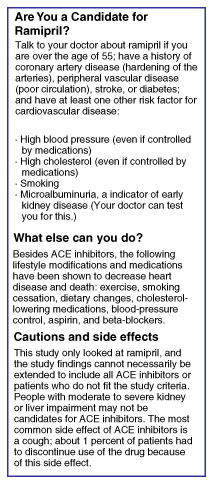New drug shows impressive results in preventing heart problems
By Jonathan Freedhoff, M.D.
Each week hundreds of medical journals publish thousands of new articles, and for most doctors reading them all is simply impossible. From time to time, however, a study is published with results so impressive that it changes the way we practice medicine. In January of this year, the New England Journal of Medicine (NEJM) published one of such landmark study with far-reaching implications for heart attack and stroke prevention.
The Heart Outcomes Prevention Evaluation, or HOPE, trial spent four and a half years studying 9,297 patients at 267 different medical centers in 19 different countries. A medication called ramipril (brand name Altace) -- part of a class of drugs called angiotensin converting enzyme inhibitors, or ACE inhibitors -- was compared with a placebo in terms of its effects on the numbers of heart attacks, strokes, heart-related hospitalizations, and heart-related deaths. The results were so striking that they were posted on the NEJM 's website months before they were published in the magazine: Patients taking the ACE inhibitor developed significantly fewer of all of the studied conditions.
ACE inhibitors 101
So how do ACE inhibitors work? The short answer, scientists believe, is they inhibit the conversion of a harmless protein to one that increases your risk of heart disease. Scientists don't completely understand how this mechanism helps reduce heart attacks, strokes, and deaths, but they know it involves a series of complex interactions between your blood pressure, kidneys, and heart.

During normal blood pressure fluctuations, your kidneys produce a chemical signal called renin and release it into your bloodstream. In your blood, renin acts on a protein called angiotensinogen, causing it to release a smaller protein called angiotensin I. Angiotensin I then finds its way to your lungs' smallest blood vessels, which in turn produce angiotensin-converting enzyme. This enzyme converts your angiotensin I to angiotensin II. Angiotensin II then travels through the body, causing your body's small arteries to constrict and signaling your kidneys to retain both salt and water. In response, your blood pressure rises.
Since angiotensin II may also affect the physical structure of the heart and its blood vessels, continued exposure to this protein may permanently damage the heart's muscle fibers. It may also increase the incidence of the hardening of the arteries, arterial blockages, and heart attacks.
ACE inhibitors, which block the conversion of angiotensin I to angiotensin II, reduce these risks by decreasing the total amount of angiotensin II circulating in your body.
Who is at risk?
The study only included patients with preexisting cardiac risk factors. Because the percentage of older Americans is increasing, however, more and more people have such risk factors. In fact, the American Heart Association has compiled a number of very sobering statistics about Americans over the age of 55:
Close to 50 percent have high blood pressure and are overweight.
Almost 25 percent have high blood cholesterol.
Five to 10 percent have undiagnosed diabetes.
Ten to 15 percent smoke.
Twenty-five to 35 percent do not exercise.
Perhaps the most staggering statistic of all is the last one: Heart disease is responsible for more than half of all deaths. Be sure to talk to your doctor about your heart health and the new ACE inhibitors -- you may just save your own life.
Related links:
Outside link: National Library of Medicine's drug information page on ACE inhibitors
Send feedback on this article.

